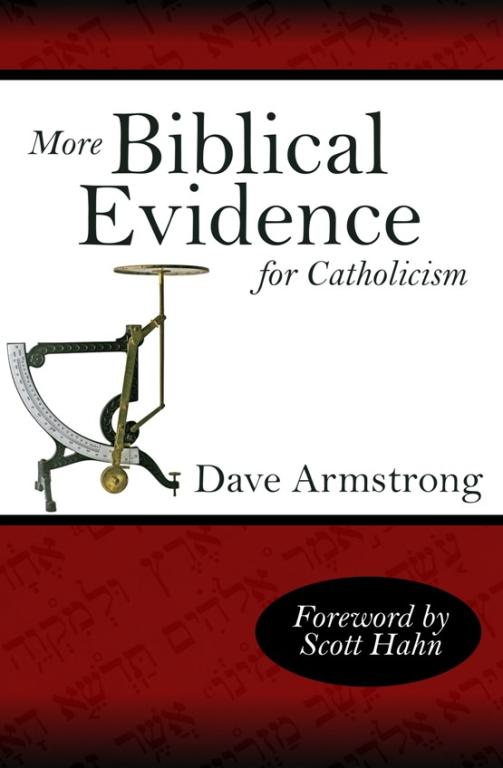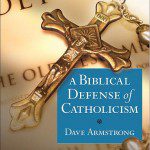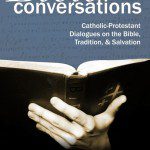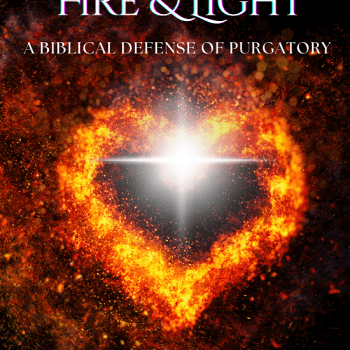[published in February 2002 by AuthorHouse and in May 2007 by Lulu]
—– To purchase, go to the bottom of the page —–
[Cover design by Chad Toney]
Table of Contents
[two chapters (or portions) are hyper-linked (blue or brown) and can be read online. Some differences in the final book edit exist. ]
Dedication
Foreword: Dr. Scott Hahn [below]
Introduction [below]
Chapter One: Biblical Indications as to the Definition of the Gospel and the Nature of Sacramentalism
Chapter Two: Fictional Dialogues on Sola Scriptura (“Bible Alone”), the Real Presence, and Penance
Chapter Three: Is Catholicism Half-Pagan?
Chapter Four: Sin and Sinners in the Catholic Church: Disproof of its Ecclesiastical Authority?
Chapter Five: Denominationalism and Sectarianism
Chapter Six: Catholicism is Neither Pelagian Nor Semi-Pelagian (The Nature and Extent of Human Effort in Salvation)
Chapter Seven: “Is This God?”: Biblical and Philosophical Reflections on the Blessed Eucharist
Chapter Eight: Why the Catholic Mass is Not Idolatry
Chapter Nine: The Old Testament, the Ancient Jews, and Sola Scriptura
Chapter Ten: Was the Catholic Church an Avowed Enemy of Holy Scripture in the Middle Ages or at any Other Time?
Chapter Eleven: Insurmountable Practical Problems of Sola Scriptura
Chapter Twelve: Dialogue on the Alleged “Perspicuous Apostolic Message” as a Corollary of Sola Scriptura
Chapter Thirteen: Dialogue on the Logic, Epistemology, and Practical Application of Catholic Infallible Authority
Chapter Fourteen: Dialogue on Biblical Arguments for Purgatory
Chapter Fifteen: A Biblical and Theological Primer on the Veneration of the Blessed Virgin Mary, Her Sinlessness, and Her God-Ordained Function as Mediatrix
Chapter Sixteen: Mary the Mediatrix: Biblical Rationale and Deeper Reflections and Explanations
Foreword
Dr. Scott Hahn
When I began investigating the claims of the Catholic Church in the early 1980s, there were relatively few popular books on the market written explicitly to present the case for the Catholic Church vis a vis Protestant beliefs. In the last two decades Catholic apologetic resources have proliferated. I am grateful that more and better tools are consistently being made available for the work of building up the Church, the kingdom of God on earth.
More Biblical Evidence for Catholicism is one such helpful building tool. In this book, David Armstrong has supplied useful information to engage those who are not enemies, but brothers and sisters who seek the fullness of God’s family in the Catholic Church. This book provides information that can help lower barriers between Catholics and non-Catholics by exchanging information and perspectives on doctrinal issues such as sola scriptura, the Eucharist, and salvation. It can prepare Catholics to give a clearer answer for the hope that is within them (1 Pet. 3:15).
Reading this book needs to be accompanied by a significant amount of prayer. No amount of information or argumentation alone opens the heart to the grace of God. And the grace of God does not merely call us to intellectual assent to truths. We need to encounter Truth in the depths of our hearts, and answer His call to deny ourselves, take up our cross and follow Him (Mt. 16:24).
Introduction
This work is intended as a companion piece and continuation (in terms of the general category of reasoning or apologetics) of my first book, A Biblical Defense of Catholicism. Once again my purpose is to accumulate biblical arguments in support of distinctively Catholic doctrinal positions, with Protestant readers particularly in mind (as well as Catholics not overly familiar with the Bible).
I also touch upon the closely-related subjects of sola Scriptura (the Protestant notion of Scripture Alone), the Catholic Church’s high regard for Holy Scripture, and critiques from our separated Christian brethren with regard to matters of ecclesiology (Church) and Tradition (i.e., the twin Catholic counter-principles to sola Scriptura), primarily in chapters nine through thirteen.
Additionally, a fair degree of emphasis has been devoted to certain common and erroneous charges against the Catholic Church (chapters three, four, six, and eight) and to dialogue (back-and-forth discussion), so that readers can have a sense of interaction with opponents of various Catholic doctrines, and how they might be answered from Scripture, history, and reason.
Almost all of these chapters came about as a result of challenges and dialogues undertaken via e-mail and Internet lists and bulletin boards, from mid-1996 through to mid-2000. My first book was much more heavily-researched and oriented towards use as a “reference,” whereas the present work is more expository, informal, “essay-ish,” and conversational in nature, due to the circumstances in which most of the writing occurred (thus there are far fewer footnotes, by design).
A Biblical Defense of Catholicism tended somewhat toward the catechetical, descriptive end of the theological spectrum; here I am trying to get further behind the thought and rationale of Catholic theology – to explore its “worldview” or underlying assumptions a bit more thoroughly, and even – sometimes – the epistemology of the Catholic believer (i.e., why and how they believe what they do: the process of acquiring that knowledge, or possible, theoretical rationales for it).
This exploration of underlying presuppositions and premises is especially true of the last two chapters on Mariology, which delve into very deep spiritual and theological matters (no doubt quite inadequately, but one has to start somewhere, and I am learning much myself, as I ponder, meditate, and jot down my own thoughts). I find that my own thoughts are greatly stimulated by direct challenges. Traditionally, Catholic apologetic endeavors have usually been counter-reactions to views which arose and competed with the accepted, received doctrines and teachings of the Catholic Church. Mariology developed in reaction to Nestorianism.
Trinitarianism developed as a result of Sabellianism and Arianism. The doctrine of Christ (particularly, His Two Natures) was, in the long run, better understood by the early Church and “fine-tuned” because of the dangers to orthodoxy posed by the heresies of Monophysitism and Monothelitism. St. Augustine developed his ecclesiology and theology (particularly with regard to grace) in the course of his disputes with the Donatists, Pelagians, and Manichaeans.
The details of all those noble and necessary battles waged for Mother Church are unimportant at the moment; my point is that much of theology, as well as apologetics, is done in the “heat” of competition and challenge. These confrontations help us to strengthen and better understand our own opinions and beliefs (or, conversely, to repudiate them if they are found wanting). This has been very much my experience on the Internet. I love the challenges which have come my way, and I my own faith has been greatly strengthened when the arguments I produced in the course of dialogue (ultimately almost wholly derived from the Bible itself or past defenders of the Catholic faith) withstood attacks and therefore provided further support for the Catholic position.
It has always been this way for Christians who are out in the “world,” in the marketplace of ideas, contending for the faith. Jesus disputed with the Pharisees and other religious authority figures of His time, and – sadly – His own townspeople. St. Paul – as Scripture informs us – routinely “argued” and “reasoned” with both Jews and Greeks. The Church Fathers opposed many false teachings and presented a positive message of the Gospel in the (altogether biblical) context of the one, holy, catholic, and apostolic Church. I seek to follow their example and offer up my own meager contributions to the defense of Catholicism. I would like to share with readers some of what I have learned in my various dialogues and debates.
My thoughts and arguments throughout the book are not always (indeed, not usually) thoroughly-formulated, nor do I think they are even necessarily always successful, by any means. I am happy to leave that judgment of success or failure to the reader. My intention is to provide examples (especially in the dialogue chapters) of a Catholic grappling with opposing views and attempting to give an orthodox, magisterial Catholic response. These are real-life encounters, or at the very least, essays which were written with competing ideas and premises and worldviews (several of which I used to hold myself) very much in mind at all times.
I hope and pray that I have done justice to the topics I have dealt with, and that I have – in some small way – helped others to understand some things better, by God’s grace. I am not a theologian, and have no formal theological training (though a great deal of informal training, these past twenty years). But perhaps that is preferable for my purposes, since (hopefully) I can express these points on a more popular level (assuming I do have correct beliefs concerning them), as opposed to a strictly academic, scholarly level.
I have never claimed to be a scholar, because I am not, and I reiterate that again here, lest anyone misunderstand the level of ambition for what I am presently attempting to do. I appreciate when someone thinks that I do possess such credentials (occasionally I receive such feedback), and it is flattering. But readers looking for the “latest research” or absolute rigor and documentation of every claim made will not find it here. Plenty of books can offer that (such as those by Dr. Scott Hahn), and I heartily recommend them, and use them myself, all the time. But I am trying to do something a little different.
My strength of argument exists only insofar as my reasoning and exposition is in harmony with both Sacred Scripture and Sacred (Apostolic) Tradition. I hope that I am completely in accord with those sources of true Christian dogma (I certainly always try to be). They can quite hold their own: truth has that inherent power. Our job as Catholic apologists is to communicate these truths accurately and in terms that our target audience can understand, and to show that they are more plausible and worthy of belief, in so doing.
The Catholic apologist mainly tries to remove obstructions or roadblocks, and to help clear up misunderstandings and erroneous “debris” which often surrounds Catholic teaching and the Catholic Church. I also pray that our Lord God will help readers discern any of my own errors or inadequate charity, manner, or presentation, which got mixed in with the “passing-on” of true Christian Tradition, and will “discard” them like the bone of a delicious chicken leg, or the seeds of an apple.
Reviews
Reviews at the old amazon.com page (seven total)
See also my paper: Two New Reviews of More Biblical Evidence for Catholicism
***
Purchase Options
***
[PAPERBACK: List: $19.95] [KINDLE: 2.99] [NOOK: 2.99] [APPLE BOOKS: 2.99] [KOBO: 2.99] [LOGOS BIBLE SOFTWARE / FAITHLIFE: ONE OF NINE BOOKS] [ePUB: 2.99]
***
Last updated on 3 June 2023
***














